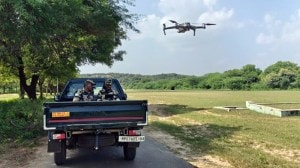Karnataka: Covid adjustments by High Court nudge key cases towards trial
The video conferencing provision, which bypasses the need for physical presence of suspects during key legal junctures ahead of a trial, has been able to move high-profile cases, like that of the murder of journalist Gauri Lankesh in 2017.
 The Karnataka High Court. (File)
The Karnataka High Court. (File)A provision made by the Karnataka High Court during the Covid-19 crisis to expedite the process of trials in criminal cases by framing charges against accused individuals through video conferencing has helped sessions courts move several important cases towards a stage where a trial can commence.
The video conferencing provision, which bypasses the need for physical presence of suspects during key legal junctures ahead of a trial, has been able to move cases like that of the murders of journalist Gauri Lankesh in 2017, the Lingayat researcher and writer M M Kalburgi in 2015 – both by an alleged Right-wing extremist group — closer to the trial stage, as also a 2005 terrorist attack on the Indian Institute of Science in Bengaluru by an alleged LeT sleeper cell.
In the Kalburgi and the IISc terror attack cases, the trial courts in Karnataka framed charges against suspects located in remote prisons of the country through video conferencing in September this year while charges will be framed soon through video conferencing in the Gauri Lankesh case.
In the case of the murder of the Kannada researcher and writer M M Kalburgi – which occurred on August 30, 2015 in Dharwad – where a group of six Hindutva extremists were accused of shooting the writer down (five of whom are also accused in the Gauri Lankesh murder case) charges were framed through video conferencing on September 7 this year by the district court in Dharwad.
The charges were framed against alleged extremists Amol Kale, 37, Ganesh Miskin, 27, Praveen Chatur, 26, Vasudev Suryavanshi, 29, Sharad Kalaskar, 25 and Amit Baddi, 27 – for murder and criminal conspiracy under the Indian Penal Code and sections of the Indian Arms Act of 1959.
The accused men are alleged to have plotted and executed the killing of Kalburgi, 77, at the doorstep of his home as a part of the Right-wing extremist group’s strategy of killing people considered to be opponents of radical Hindutva ideas and thoughts.
However, the provision has also given rise to a few problems. After the framing of charges last month, Suryavanshi alias Mechanic, a resident of Maharashtra – who allegedly procured a motorcycle used in the murder, has written a letter to the trial court saying he did not understand the charges that were read out against him and five other accused in Kannada and Marathi.
The presence of Suryavanshi and three others lodged in the Arthur Road Jail in Mumbai for crimes committed in Maharashtra was obtained through video conferencing for the framing of charges, while one accused was produced from the Mysuru Central Jail and another from Dharwad.
After ascertaining the quality of audio at the jails from where the accused were presented, the district court proceeded with the process of framing charges. After the court read out the charges in Kannada and Marathi, the accused claimed to have “understood the contents read over to them” and pleaded “not guilty” and sought a trial, the Dharwad trial court observed last month.
On September 28, when the district court convened to fix a date for the start of the trial, it pointed out that Suryavanshi had addressed a letter to the court where he stated “he could not make out the charge as he knows only Hindi language”.
The court observed that on September 7, while recording the charges, it “explained to all the accused persons that, charge will be read over in the language known to them i.e. in English, Hindi as well as Marathi” and an advocate who knew Marathi had read out the charges which were recorded. The court has now asked for Suryavanshi to be produced again to allow him to have a say.
In the normal course of criminal proceeding, persons who are accused in a case have to be present physically for the framing of charges but a High Court order of June 2020 issued to surmount hurdles posed by the pandemic allowed framing of charges through video conferencing against accused persons lodged in remote prisons in order to facilitate the process of the commencement of the trial of a case.
The Karnataka High Court had stated that framing of charges through video conferencing would not violate provisions of the Criminal Procedure Code which requires the presence of an accused in the court during the procedure for framing charges. “Thus, at the time of framing of charge and at the time of recording of plea, the presence of the accused before the court can be procured through video conferencing. By procuring the presence of the accused through video conferencing in case of sessions cases and in case of warrant triable cases, the charge can be read over and explained to the accused and his plea can be recorded,” the high court had further observed in its order last year.
“Video-conferencing is an advancement in science and technology which permits one to see, hear and talk with someone far away, with the same facility and ease as if he is present before you i.e. in your presence. In fact, he/she is present before you on a screen. Except for touching, one can see, hear and observe as if the party is in the same room. In video-conferencing both parties are in the presence of each other,” the High Court said, quoting a 2003 Supreme Court order that allowed presentation of evidence in cases through video conferencing.








